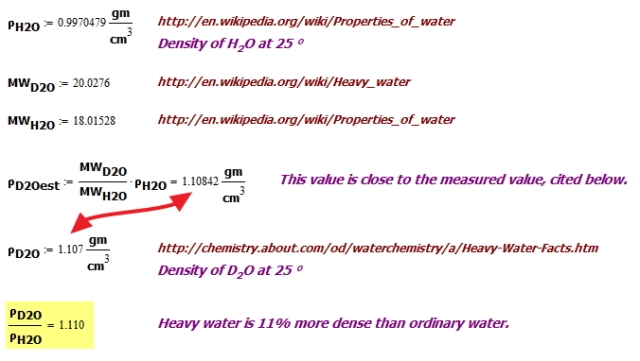Quote of the Day
The problem with object-oriented languages is they’ve got all this implicit environment that they carry around with them. You wanted a banana but what you got was a gorilla holding the banana and the entire jungle.
— Joe Armstrong. I love the object-oriented (OO) methodology for solving a problem, but I rarely get to use OO because my development work is all embedded.
Introduction
Figure 1 shows a photo of heavy water ice cubes sinking in ordinary water (Source: Science Photo Library). I find this an interesting photo. Let's discuss it a bit.

Figure 1: Heavy Water Ice Cubes Sink in Water (Left) While Ordinary Ice Cubes Float in Water (Right).
Background
Like regular water, heavy water is composed of two hydrogen atoms bonded two one oxygen atom (H2O). Each hydrogen atom in ordinary water has a nucleus that contains one proton and zero neutrons. This isotope of hydrogen is called protium. Heavy water is also composed of two hydrogen atoms bonded to one oxygen atom, but the hydrogen atoms in heavy water are an isotope of hydrogen with a nucleus that contains one proton and one neutron called deuterium (2H).
Figure 2 illustrates the difference between these forms of water (Source). Ignore the illustration of tritium (3H) for the following discussion.
 |
 |
Analysis
Let's discuss why heavy water ice cubes sink in ordinary water. For something to sink in ordinary water, its density must be greater than that of ordinary water. To estimate the density of heavy water, we can make some assumptions:
- Atoms of heavy water and ordinary water are the same size
- Heavy water ice and ordinary ice form exactly the same crystal structure.
Given these assumptions, we can estimate the density difference between heavy water and ordinary water by the percentage difference between the molecular mass of heavy water relative to ordinary water. That calculation is shown in Figure 3. I also list the measured density of heavy water and show it is 11 % more than ordinary water at 25 °C.
Conclusion
Creating heavy water ice cubes and seeing them sink in ordinary water is interesting. It is also expensive since relatively pure heavy water costs about $3 per gram.
I also found this video that illustrates the difference in flotation between heavy water and ordinary water.


Pingback: Agua, molécula fundamental (IV): Filosofía de la Química | Enseñanza, Historia, Filosofía y Divulgación de la Química
It was true and obvious 😉
Not obvious. Normal ice floats because of the expansion of ice when normal water solidifies into ice. So the density difference created by heavy water, about 10% must be a larger effect than the density reduction caused by solidifying. See http://chemistry.about.com/od/heavywater/fl/Does-Heavy-Water-Ice-Sink-or-Float.htm
There was obviously lead inside the second cube.
Transparent Lead :->
Quite interesting
been searching for ten minutes on google and wiki. this is the best result i have found.
thank you.
obvious although important to know i suppose
nice link
This post was intended to show how to estimate the density of a heavy water ice cube. However, the fact that ice floats is absolutely critical to life on earth. If our water was mainly heavy water, there probably would not be life on Earth (reference).
mark
Pingback: 喝下重水會怎麼樣? - PanSci 泛科學
hmm
seems like this is more science fiction then science faction
Cute.
mark
Normal water contains some amount of Deuterium. As long as that amount is linearly roughly the same in the water as in the ice, the ice will always float. It's a bit hard to conceptualize a natural situation where the ice always contains a significantly larger proportion of Deuterium than the water does.